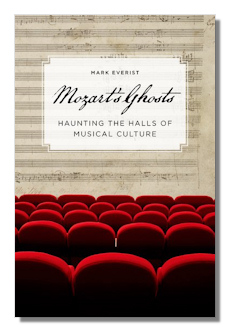
The Internet's Premier Classical Music Source
Related Links
-
Introduction
Acoustics
Ballet
Biographies
Chamber Music
Composers & Composition
Conducting
Criticism & Commentary
Discographies & CD Guides
Fiction
History
Humor
Illustrations & Photos
Instrumental
Lieder
Music Appreciation
Music Education
Music Industry
Music and the Mind
Opera
Orchestration
Reference Works
Scores
Thematic Indices
Theory & Analysis
Vocal Technique
Search Amazon
Recommended Links
Site News
 Book Review
Book Review
Mozart's Ghosts

Haunting the Halls of Musical Culture
Mark Everist
Oxford University Press, 2013. 310 pages
Hardcover, alkaline paper
ISBN-10: 0195389174
ISBN-13: 978-0195389173
This is a scholar's collection of stories about Mozart enthusiasms, almost entirely in plain English. The closest comparisons that might be made are The First Four Notes: Beethoven's Fifth and the Human Imagination, by Matthew Guerrieri, and Reinventing Bach, by Paul Elie, both by journalists and both more cohesive in theme. Everist's stories are more diverse, ranging from ghostly appearances of Mozart in Phantom of the Opera (the plot of which is told in great detail), and ghostly appearances of characters from Don Giovanni in stories by E.T.A. Hoffman and George Bernard Shaw, to more straightforward examinations of some curious questions in musicology, and an account of a critic with a long career at the Revue des deux mondes. The interest of these various stories is not likely to be uniform among readers.
Speaking for myself, the chapters of greatest interest are the ones in Everist's Part II: "'Mozart's' 'Twelfth Mass': Case Closed?" And "Enshrining Mozart: Don Giovanni and the Viardot Circle."
The "Twelfth Mass" raises a theoretical question about the value a work mis-attributed to an eminent composer might have. Mozart wrote a lot of masses, perhaps eighteen, but not the one in question here; its authenticity was questioned from the time of its first publication by Simrock "around 1821" and it was never accepted as a work by Mozart in the Köchel Catalog. However, competing with the consensus of German-speaking scholars, was the power of an 1850 edition of Three Favorite Masses (Haydn's Lord Nelson Mass, Beethoven's Mass in C, and Mozart's "Twelfth Mass", the last a reprint of a piano-vocal score published in 1819 by Vincent Novello. Here comes the interesting part. This mis-attributed work became highly popular in English-speaking countries, and different editions and arrangements were widely used in Anglican and Catholic services and other public occasions, always on the understanding that this was a work by the great Mozart. References to the "Twelfth Mass" even found their way into novels by Jack London and Joyce's Ulysses. The Novello edition is still available and still attributes the work to Mozart.
In a minor but analogous case, Everist relates Offenbach's Parisian success in presenting a version of Impressario without acknowledging that most of the music in it was not by Mozart.
Pauline Viardot, friend of George Sand and many prominent musicians, purchased Mozart's autograph copy of Don Giovanni after three national libraries passed it up. What was unusual was not so much that she had a special container made for it, but that she enshrined it as a holy relic, in effect establishing a cult. Rossini actually genuflected in front of it. Viardot became a kind of priestess.
An example of less extreme enthusiasm for Don Giovanni was the appearance in Paris of about four dozen arrangements of music from it in a single year, 1866, and Everist has pursued many of these in comprehensive detail. A twentieth-century American example of Mozart enthusiasm is the enormous popularity of the "Elvira Madigan" Concerto, the film that effectively changed the name of the Piano Concerto No. 21 on numerous recordings of the work, and led to usage of the same music in several other films.
Everist is Professor of Music at the University of Southhampton and has published four previous books about music in France, two about the thirteenth century and two about the nineteenth. Evidenced by Library of Congress Cataloging-in-Publication data., the original working title of this book was Mozart's Ghosts: Reception and Renown, 1791-Present, which was thought better of. "Reception" is a term borrowed from literary criticism, which Everist explains in his introduction but, happily, uses only occasionally thereafter.
Recommended to readers with a deep thirst for all things Mozartian.
Copyright © 2013, R. James Tobin



















